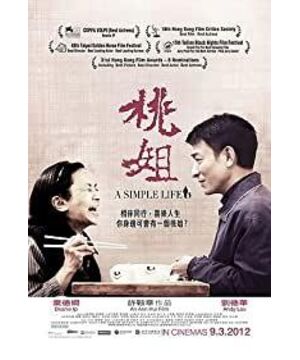Hong Kong director Hui Anhua has long been one of the most overlooked among contemporary filmmakers. However, in the film "Peach Sister" , with every detail that makes people feel natural, as well as the simple and unpretentious narrative, it has won many awards including the Hong Kong Film Awards for Best Film .
The entire film seems to be haphazardly cobbled together from personal observations, and in a sense it is. The story tells the story of a middle-aged bachelor who takes care of the old maid at home after a stroke like his own son, based on the experience of producer and screenwriter Li Luojie. Ye Dexian and Andy Lau play maids and young masters. They are godmothers and godsons off-screen, which may be the reason why they get along well on screen . Andy Lau's character is a producer at a film company, and some of Xu Anhua's colleagues (including Tsui Hark, Sammo Hung, etc.) also make cameos in their own right, seeming to imply that there's no difference between their lives and the movies they make.
"Sister Tao" considers the loneliness of contemporary life and the plight of the elderly in Hong Kong in the 21st century, but its observational perspective is so small that it is not easy to see what the film is saying at first. However, when we look back at the film, its themes and connotations emerge.
As one of the most important filmmakers in Hong Kong, Hui Anhua often uses films to tell emotional stories to show social issues . For example, "Woman, Forty" tells the story of a middle-class family caring for an elderly relative with Alzheimer's disease (the film won the Hong Kong Film Awards for Best Picture.) In recent years, Xu Anhua has focused almost exclusively on domestic stories. , thinking about the nature of contemporary society: "Auntie's Postmodern Life" centers on single women in their 60s from the middle and lower classes who take up menial jobs to escape poverty. Their helplessness to the changing circumstances of their lives shows that the individualism of capitalist culture gradually alienates people from social traditions and from each other.
"Sister Peach"'s observation of detail is so poignant that our sadness is accompanied by laughter . Shortly after Roger sends Sister Tao to the nursing home, the scene of her first meal in the public canteen is a quiet nightmare: an old man spills soup on himself, and two other people fight over food , turned into childish behavior due to their Alzheimer's, and unexpectedly, one elderly man complained that the other was wearing the wrong dentures. Conversely, tender or enchanting vistas leave a bitter aftertaste: when Roger leaves a business meeting early in the film, a secretary mistook him for an air-conditioning repairman, making him realize that in his daily life he almost There is no authority.
The theme revealed in many episodes in the film is the sense of isolation in modern society. Roger's decision to take care of Peach to pay for her nursing home and supervise her medical treatment stems both from a relationship that transcends blood and loneliness. He doesn't have a great relationship with his family, and apparently he doesn't have a romantic love story either. His deepest relationship seems to be only Sister Tao, the maid who has doted on him since childhood, and still treats him as a child and maintains his daily life. He may sublimate his loneliness by working hard, but when he sees Peach getting weaker and weaker, he realizes how small his life is. So in the end, he chose to let Sister Tao walk the last journey peacefully and told the doctor to stop the drug treatment.
The characters in the movie never articulate their feelings, they are too composed, too quiet . The director wants us to guess the complex emotional state of the characters from indirect behavioral clues. As we can see, apart from the deteriorating health of Sister Tao, its story progress is very ordinary: Roger often goes to nursing homes, and every time he returns to Hong Kong for business trips, he immediately visits Sister Tao, takes her to eat delicious food, brings Following Sister Tao’s simple interaction with other residents on her way home, she redecorated a house and left it to Sister Tao, etc. By representing the daily life and social relationships of the characters, just as people do in real life.
By encouraging close encounters with older characters, Anhua Xu also underscores the film's most troubling message: that many older adults are left without intimate, nuanced care, emotional or otherwise, in the final days of their lives. When the Mid-Autumn Festival came, the singers who came to visit the nursing home were very disdainful when no one saw them. After the photo was taken, the moon cakes had to be taken back for the next nursing home, which also showed the hypocrisy of social care and the treatment of the elderly. of indifference. To illustrate this point, the film records the scene of Roger searching for a nursing home for Sister Tao: all the services in these nursing homes are listed one by one, and the price is clearly marked, as if they are just dishes on the menu, without really understanding the elderly Real thoughts and things you want.
Anhua Xu wanted to show how ordinary people can adapt to modern life while still maintaining the trajectory of their daily life . Her narrative style is so unpretentious that it might go unnoticed, yet through a range of details, she manages to create a flawless film.
All in all, "Sister Peach" depicts two good people in mild humanistic language, which made me develop a deep feeling for both of them. This is a movie as clear as running water, no plot gimmicks, no twists and turns, just a simple life.
The article was first published on the public account: the most TOP film critics
View more about A Simple Life reviews











